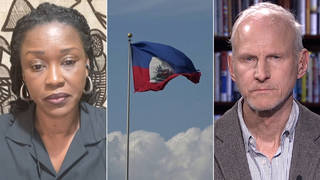
We get an update on the crisis in Haiti, where deadly violence has continued to escalate between armed groups and police fighting for control of the capital Port-au-Prince. The country’s political future remains unclear, with recently resigned Prime Minister Ariel Henry, who is stranded outside of Haiti, raising questions this week over the constitutionality of a “transitional council” formed to serve as an interim governing body until elections are scheduled. Meanwhile, Canadian forces have been sent to Jamaica to train troops from Caribbean nations to join the U.N.-authorized mission to Haiti. Haitian American scholar Jemima Pierre says the transitional council is essentially a front for U.S. interests, and warns there will be “inevitable war crimes” if foreign troops are deployed to Haiti. “It’s a terrible situation, but I think the idea that there’s a Haitian-led solution coming is actually a false one,” says Pierre. We are also joined by Kim Ives, editor of the English section of Haiti Liberté, who says Haiti is in the midst of a “revolutionary process,” led by Jimmy “Barbecue” Chérizier. Ives says that far from being a gang leader, Chérizier has built a coalition to fight the criminal groups in the country and was central to the ouster of Ariel Henry. “You always have to demonize, criminalize the people’s resistance, and that’s what we’re seeing today when they try to put all the armed groups of Haiti’s popular classes into one bag called 'the gangs,'” says Ives.

 7 months ago
24
7 months ago
24


